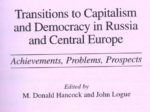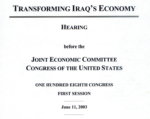This is the online-first publication in Challenge: The Magazine of Economic Affairs of an article on the labor theory of property showing the superficiality of the inequality-debate framing in terms of distribution (i.e., how much is distributed by a firm to labor versus capital) in favor of a framing in terms of what is now called “predistribution”–in this case the question of who is to be the firm in the first place, Capital or Labor.
Alexis de Tocqueville
Little-known proponents of workplace democracy:
Alexis de Tocqueville (1805-1859)
From Abstraction in Math to Superposition in QM
This is a draft paper that makes a perhaps surprising connection between the old Platonic notion of a paradigm-universal like ‘the white thing’ and an indefinite superposition state in quantum mechanics.
Review of Erik O. Wright’s Envisioning Real Utopias
I rarely review books and almost never books by Marxists. However, in order to comment on a presentation at a conference, I decided to write up my extensive comments in the form of a book review of Erik Olin Wright’s Envisioning Real Utopias.
Review of Dahl’s Preface to Economic Democracy
This is my review in Commonweal of Robert A. Dahl’s 1985 book Preface to Economic Democracy shortly after it was published.
Straddler interview and video
This is the text and edited video of an interview with The Straddler in January 2016 entitled: Against the Renting of Persons.
My Congressional Testimony on Iraq in 2003
This is my testimony to the Joint Economic Committee of Congress in 2003 making recommendations after the U.S. conquered Iraq and had to figure out what to do. Today, it can be read as a negative-blueprint since the U.S. seems to have done just the opposite on every count.
Reply to Commentators on Labor Theory of Property
My paper on marginal productivity theory and the labor theory of property in the on-line journal Economic Thought drew commentaries for Jamie Morgan and Ted Burczak. After some back and forth on the journal’s discussion forum, this Reply to Commentators paper was published as an article in the journal.






